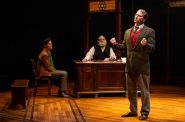“Clybourne Park” actors share more than stage time
Engaged actors Grant Goodman and Jenny McKnight work across the U.S. The Rep's given them the chance to work together.

Grant Goodman and Jenny McKnight (center) share a Rep stage for the third time in “Clybourne Park.” Also pictured: Gerard Neugent (left), Marti Gobel (right) and James T. Alfred. Photo credit Michael Brosilow.
The Milwaukee Rep’s production of Clybourne Park, an expansion on the famous race-relations play A Raisin in the Sun, is almost entirely comprised of pairings. There’s the meta-pairings – each actor plays one role in the 1959-set first act and another in the present day-set second – as well as those on stage: the white couple selling their house to the black Younger family, the couple trying to talk them out of it, the black housekeeper and her husband drawn into the discussion, and the two couples of the second act drawn again into conflict over the house’s sale.
And there’s one off-stage: actors Grant Goodman and Jenny McKnight, the play’s “married couple.”
“Married” isn’t quite right – they’re merely engaged, for now – but the two joked that was more to do with their hectic lives than anything else when I met with them earlier this week. Lucky enough to have secured a long string of steady jobs, the couple’s been working across the country effectively nonstop, constantly traveling from show to show. They do have a home base, of course – a 10-by-10 storage unit in Chicago.

Goodman and McKnight (both left, with Cassandra Bissell, R) were last seen together in Milwaukee for “In the Next Room (or, The Vibrator Play). Photo credit Alan Simons.
That last production marked the first time they’d shared a stage since they met, at a 2004 staging of Pride & Prejudice at the Indiana Repertory Theatre. Austin’s romance sparked their own, and shortly after Goodman moved from New York, where he’d traveled for college from a small-town in Indiana, to join McKnight in Chicago, where she’d moved after getting an MFA in her home state of Alabama.
Since then, they’ve grown accustomed to their itinerant “gypsy” life. “About a year and a half into it, it started to become a little difficult,” Goodman said. “But lately, we’ve really embraced it because we have been lucky enough to work a lot.”
“And to work together,” McKnight cuts in. (They do things like that, build on each other’s sentences. It’s endearing.)
Goodman smiles. “And to work together.”
Despite the fact that the two don’t always get that chance to work together – or even in the same city – both say there’s a benefit to both being in the same industry. “There’s a certain understanding that we have of what each other does that’s important,” McKnight said. “I know people do it, and make it work, and often very successfully – but it would be hard, I think, to have a relationship with somebody who didn’t have that inside understanding of what it is that we do. I mean, I’ve had to stand on stage and watch Grant make out with another woman. Honestly.”
“And if we didn’t know the reality of that and how that worked –“
“It might be a little touchy.”

“Clybourne Park” is divided into two time periods, a 1959 section where a white family decides to sell their house to the Youngers, and a modern-day section where a new white couple buys the house, now in a mostly black neighborhood, to tear it down. Photo credit Michael Brosilow.
Clybourne Park puts them in touchy situations of an entirely different sort. Bruce Norris’ 2011 play, which won an Olivier, Tony and Pulitzer, can be seen as bookends to Raisin: the first act takes place in the house just before it is sold to the only black family in an all-white neighborhood, and the second act looks 50 years ahead to the house’s sale to a white couple only seeking to tear it down and replace it with a new, expensive home unbefitting the now-black neighborhood. But Goodman and McKnight say it can also be seen as a play in its own right, one that deals with more than just race and gentrification.
“[Norris] has put everything in this play,” Goodman said. “It’s all in there. Religion, disability, homosexuality … Everything’s in it. He doesn’t leave anyone untouched. Or unscathed.”
That said, race relations are securely at the heart of Clybourne Park. McKnight said the cast’s extended preparation and table work allowed them to zero in on some of those issues before blocking began. “This play is a lot about white hypocrisy, in the sense that a lot of problems around the issue of race in America right now stem from a white attitude of ‘we’re moving forward, things are progressing,’” McKnight said. “And I can understand more clearly than I did before why that is frustrating to actual progress. There has to be a willingness to have the discussions that we had in an environment where you might get your feelings hurt but you’re still willing to continue talking.”
That’s in full display throughout Norris’ play, which Goodman says will often throw out a joke or gag just to dupe an audience into laughing before they realize what they’re laughing at. “One character in the first act, Betsy, is deaf, and there are some jokes made at her expense. Because somehow it’s okay to laugh at a deaf person, but no, we’re above laughing at a black joke or a homosexual joke, right? And I think that’s where he blurs the lines.”
It’s not going to be everyone’s cup of tea, McKnight admits. “They won’t like it, and that’s okay.” But for those who do see the play, she promises there’s no reason to be worried about finding the wrong moment funny or disconcerting. “There’s room for hilarious laughter and for the uncomfortable moment. And all of those responses are appropriate.”
The Milwaukee Rep’s production of Clybourne Park opens tonight (Friday, Feb. 1) and runs through Feb. 24. The cast also includes James T. Alfred, Lee E. Ernst, Marti Gobel, Gerard Neugent, Greta Wohlrabe and J.R. Yancher. Tickets are $10 to $65, and can be purchased online or at (414) 224-9490.
Theater
-
‘L’Appartement’ Is a Mind-Bending Comedy
 Mar 25th, 2024 by Dominique Paul Noth
Mar 25th, 2024 by Dominique Paul Noth
-
‘The Mountaintop’ Offers Very Human Martin Luther King Jr.
 Mar 11th, 2024 by Dominique Paul Noth
Mar 11th, 2024 by Dominique Paul Noth
-
‘The Chosen’ Is Subtly Powerful Drama
 Mar 10th, 2024 by Dominique Paul Noth
Mar 10th, 2024 by Dominique Paul Noth
















